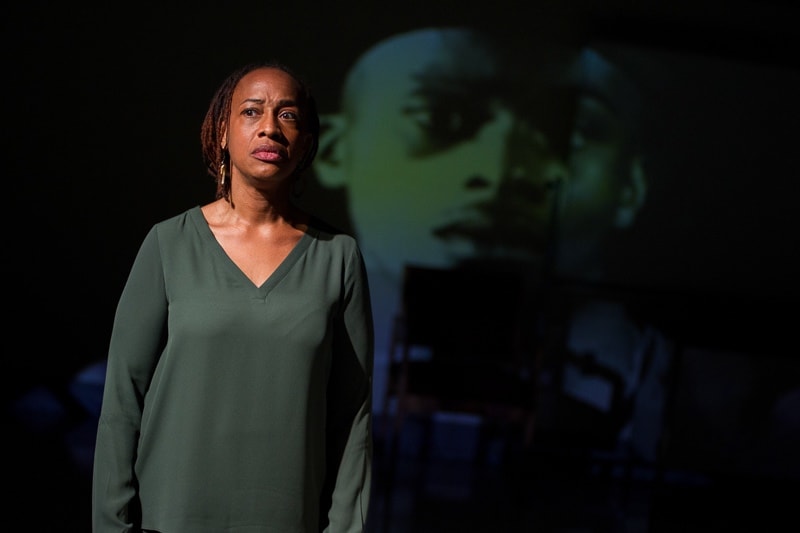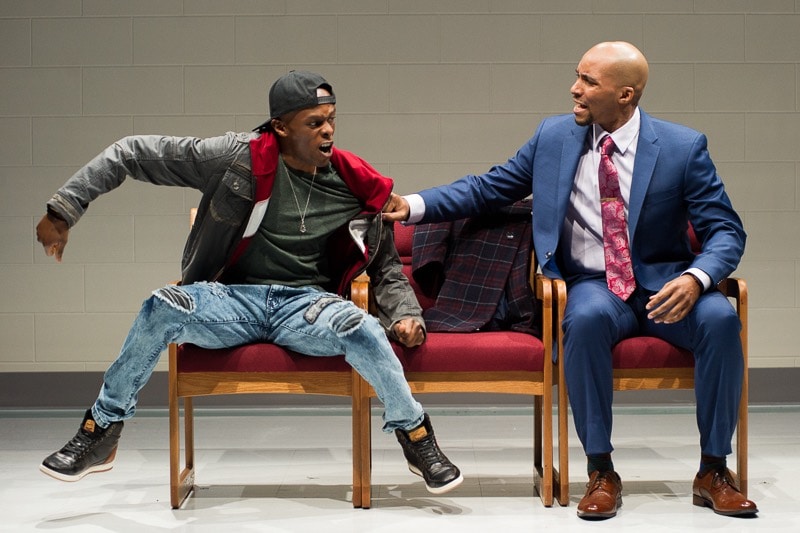The set for Dominique Morisseau’s Pipeline at Studio Theatre could not be any whiter. Its white walls of freshly painted concrete blocks span the breadth of the stage and extend around the audience. Its glistening white floor shines like new. High on the walls, light glows through sparkling clean white frosted windows. For this story about a Black boy sent by his parents to a pricey white boarding school, Scenic Designer Arnulfo Maldonado has built a world so spotless-white and institutional it seems unreal. Except that what’s about to go down for that Black boy will have everything to do with the reality of the institution of whiteness.

The boy’s mother, Nya, is a 30-something single public school teacher who in Andrea Harris Smith’s deeply affecting performance is on the verge of unraveling. She is overcome with grief and foreboding because her teenage son, Omari, powerfully portrayed by Justin Weaks, has just physically assaulted a white teacher in class. She knows this now means Omari is at risk of expulsion and possible charges that could ensure him a position in the school-to-prison pipeline. The pipeline that sucks in Black youth as a matter of state-sanctioned policy and imprisons them for profit. The pipeline that she and Omari’s father hoped they could exempt their Black son from by schooling him where it’s white.
The narrative unfolds over ten intense scenes directed tightly by Awoye Timpo. We meet Omari’s foxy-smart Latinx girlfriend, Jasmine (Monica Rae Summers Gonzalez); Nya’s dedicated coworkers Laurie (Pilar Witherspoon) and Dun (Ro Boddie); and Nya’s slickly successful ex, Xavier (Bjorn DuPaty), who performs fatherhood remotely by paying Omari’s tuition and sending punctual child-support checks.
Early on we find out what Omari’s offense was: he shoved his teacher against a smartboard, an abrupt act of aggression that got videoed and is going viral. But all along, the play leads us to wonder why. Why did Omari do that? Why did he snap? What was happening inside him that made him suddenly act out in such rage?
READ Bob Ashby’s review, “Mother and son fight to stay afloat in ‘Pipeline’ at Studio Theatre.”
The production surrounds Omari’s crisis with graphic visuals that give stark social context. Projections Designer Kelly Colburn episodically floods those white walls with brutal footage of Black youths brawling, rioting in the streets, getting brutalized by police, violent montages of chaos. But Omari acted alone. In a cultured literature class. Within a world of white privilege where he knew he didn’t fit. Where he felt targeted and regarded with suspicion.
Omari explains to his mother how in a class where he was the only Black student, his teacher’s singling him out triggered him to attack back:
OMARI: We get to discussing the reading, Native Son—Richard Wright. And he start asking questions. What made Bigger Thomas kill that woman? What were his social limitations? What made the animal in him explode? And who he lookin’ at when he askin’ all these questions, Ma. Who he lookin’ at?

In a later scene, Omar retells the same inciting incident to his father, except now his anger at his teacher’s racialized insinuation is compounded by his anger and hurt over Xavier’s absence from his life:
OMARI: I sat there. Listenin’ to [the teacher talking about] single mother poor angry animal Bigger Thomas. And when the teacher come askin’ me what I thought, I felt like he was sayin’ something to me. Like he knew I was sitting there, thinkin’ about you, feelin’ single mother poor angry animal Bigger Thomas–like. And he start sayin’ Mr. Joseph—what made Bigger Thomas do that to that girl? What were his social limitations? What made the animal in him explode? And he lookin’ at me….
Both Nya and Xavier struggle to understand why Omari reacted as he did, and Omari tries mightily to explain himself, how he felt he was being regarded by the teacher as an animal. But there’s more about what motivated Omari to attack that Morriseau lets us know in clues tucked in the voices of other characters. One of them is Omari’s girlfriend, who says to Nya:
JASMINE: Sometimes people push you too far. Make you feel like an animal from another jungle. Like you don’t belong even when you’re here. Cuz they got expectations that you of the wild. So you become the expectation. But it ain’t born in you, know what I’m sayin’. It ain’t what you want to be. It’s what you become….
Another character with a crucial clue is Dun, the Black security guard in Nya’s school:
DUN: How you gonna stop it [Black boys fighting] if you don’t know the source? … Gotta know what they carry in them. The resentment and the rage…there’s a legacy in that.
Nya herself finally grasps the history of what’s at stake for Omari—and confronts the crushing stigma of the angry Black man head-on—in a speech she gives to the school board hoping to persuade them not to press charges:
NYA: … This rage is not his sin. It was never his sin. It is his inheritance.
Pipeline is a must-see play. It burns with the passion of a loving Black parent and blazes with insight about her at-risk Black son. And as this luminous Studio Theatre production makes clear, it shines a bright light on what gives white the right.
Running Time: One hour 35 minutes, with no intermission.
Pipeline plays through February 23, 2020, at Studio Theatre’s Mead Theatre, 1501 14th St NW, Washington, DC. For tickets, call 202-332-3300 or go online.





I am always interested in what John writes. This play comes alive and makes me want to engage in that uncomfortable space where “what we inherited” triggers all of us. Understanding this may be the beginning of putting down our weapons. I’m going to see this. Thank you, John.